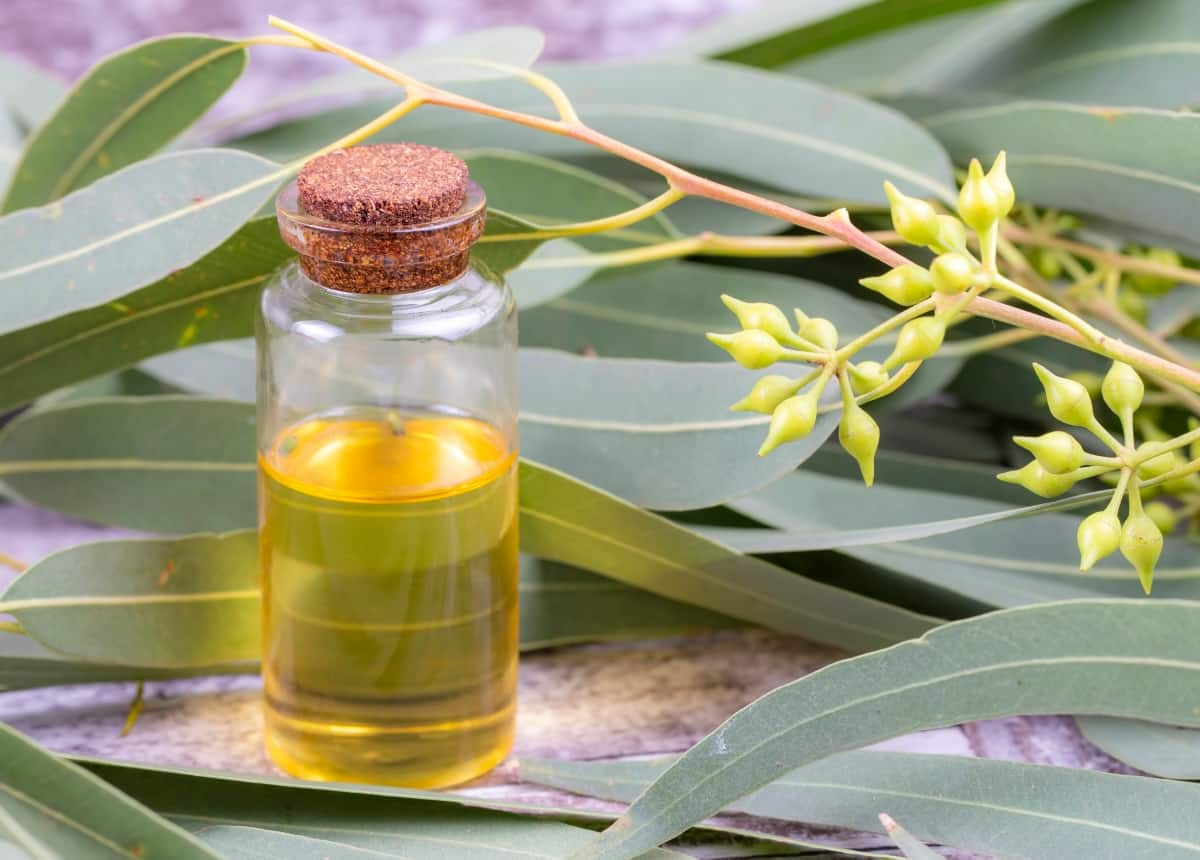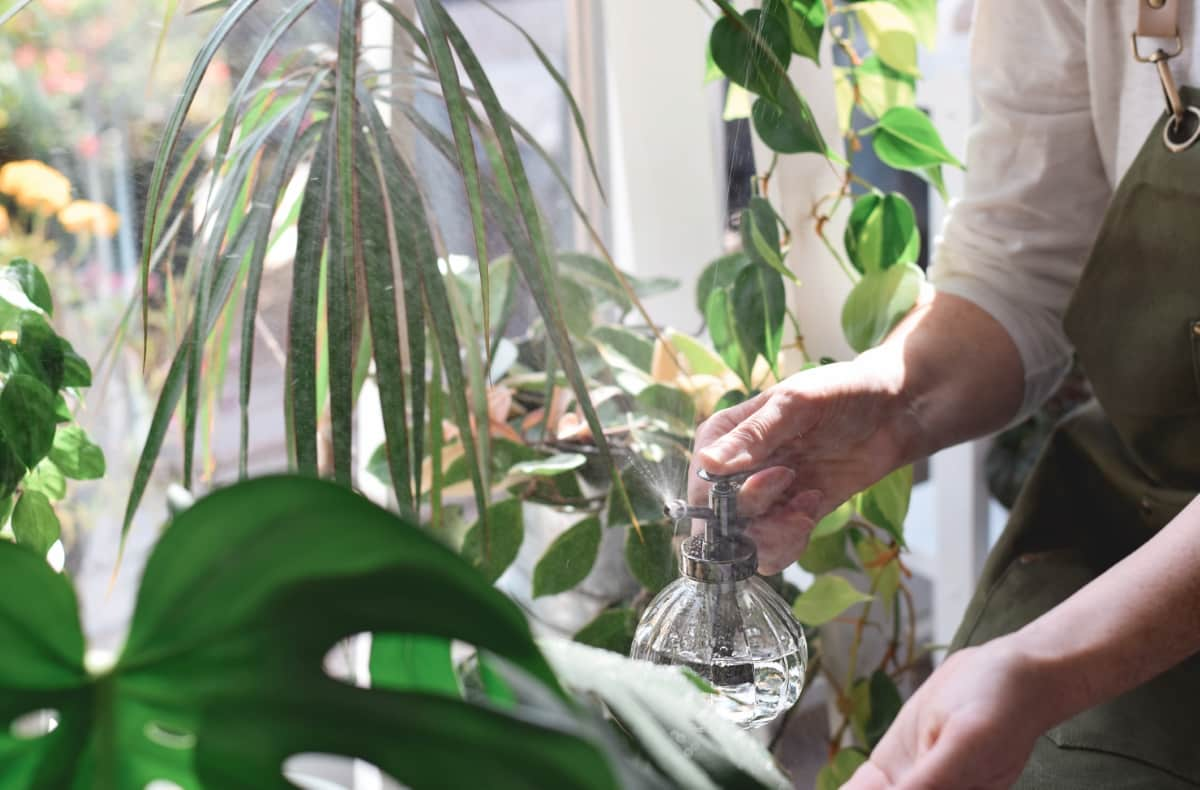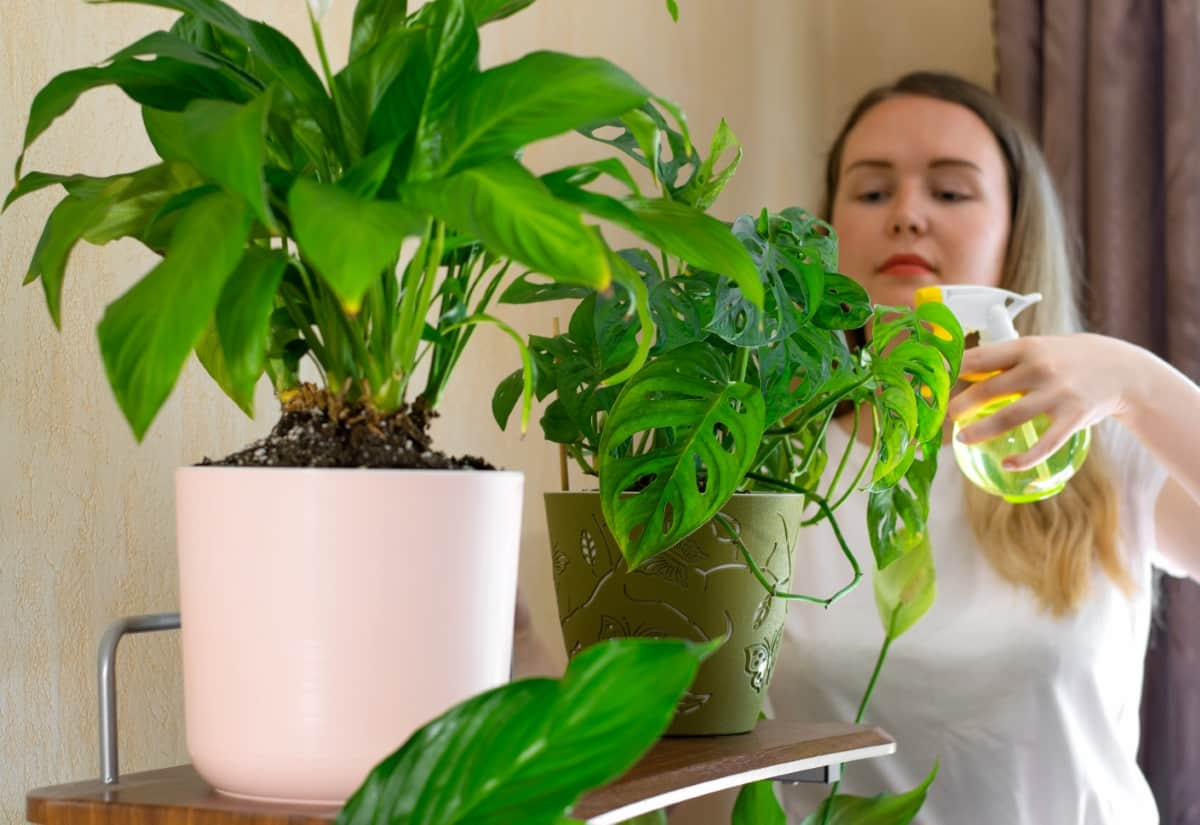Eucalyptus oil, which is made from the leaves of eucalyptus trees, serves as an effective and natural solution to combat pests infesting your houseplants. Known for its insect-repelling properties, eucalyptus oil acts as a deterrent against common pests like mites, aphids, and flies. This natural alternative not only safeguards your plants but also avoids the use of harmful chemicals that may be present in commercial pesticides. Eucalyptus oil works by disrupting the respiratory systems of pests, making it a safe and organic pest control option.

DIY Eucalyptus Oil Spray for Houseplant Pests
Step-By-Step Guide to Making Eucalyptus Oil Spray for Houseplants
- Ingredients: Gather 1 cup of water, one tablespoon of eucalyptus oil, and a small amount of mild liquid soap (to help the solution adhere to plant surfaces).
- Mixing the Solution: In a spray bottle, combine the water, eucalyptus oil, and a few drops of liquid soap. Shake the bottle well for better mixing.
- Spraying the Plants: Liberally spray the eucalyptus oil solution on the leaves and stems of your houseplants. Pay special attention to the undersides of leaves, as pests often hide there.
- Frequency: Apply the eucalyptus oil spray once a week or as needed, especially during periods of increased pest activity.
- Observation: Monitor your plants for any signs of pests and adjust the frequency of application accordingly. The eucalyptus oil should help keep your houseplants healthy and pest-free, promoting a thriving indoor garden.
How to Mix Eucalyptus Oil for Plants
Achieving the right concentration is crucial for the effectiveness of your eucalyptus oil spray. To mix eucalyptus oil for plants, dilute 1-2 teaspoons of pure eucalyptus oil in a quart of water. Adjust the ratio based on the sensitivity of your plants; some may tolerate a stronger solution.
For added effectiveness, consider incorporating a small amount of mild liquid soap into the mixture to enhance the spray’s adhesive properties. Thoroughly mix these ingredients in a spray bottle, and your organic bug control solution is ready for application. Regularly treat your houseplants with this DIY eucalyptus oil spray to maintain a pest-free and healthy indoor garden.
The Benefits of Using Eucalyptus Oil as a Natural Bug Repellent for Indoor Plants
Eucalyptus oil stands out as a versatile and effective natural bug repellent for indoor plants. Beyond its pleasant aroma, eucalyptus oil acts as a potent deterrent against a variety of pests, including mites, aphids, and spiders. Its antifungal and antibacterial properties contribute to overall plant health, preventing diseases that pests often introduce. Using eucalyptus oil is a sustainable and non-toxic approach, ensuring a safe environment for both your plants and household.
Eucalyptus Oil Spray Recipes for Different Types of Houseplant Pests
Eucalyptus oil spray serves as a natural and effective remedy for various houseplant pests. It acts as a deterrent and insecticide, targeting common invaders like aphids, spider mites, and whiteflies. The oil’s strong scent disrupts pests’ feeding and reproductive cycles, preventing infestations. Additionally, it proves effective against scale insects, mealybugs, and fungus gnats. Eucalyptus oil’s antifungal properties also combat mold and mildew.
In case you missed it: Homemade DIY Eucalyptus Leaf Spray for Pest and Disease Control: Recipe for Natural and Organic Benefits of Plants

How to Apply Eucalyptus Oil Spray to Protect Your Houseplants from Insects
- Preparation: Mix the chosen eucalyptus oil spray recipe in a clean spray bottle, ensuring thorough blending.
- Targeted Application: Spritz the solution evenly on both sides of the leaves and stems, focusing on areas prone to pest infestation.
- Regular Maintenance: Apply the eucalyptus oil spray weekly or adjust the frequency based on pest activity. Consistent use enhances the protective barrier and supports plant health.
- Observation: Monitor plants for signs of pests and adjust the spray routine accordingly. Regular applications ensure a bug-free and thriving indoor garden.
Using Eucalyptus Oil Insecticide as Safe and Effective Solution for Indoor Gardening
Eucalyptus oil insecticide provides a safe and efficient solution for maintaining a pest-free indoor garden. This natural alternative effectively repels insects while ensuring the well-being of your houseplants. Unlike chemical insecticides, eucalyptus oil is non-toxic, making it a healthier choice for both plants and residents. Its aromatic properties not only deter pests like mites and aphids but also contribute to a pleasant indoor environment.
Organic Eucalyptus Oil Pest Control: DIY Tips for Healthy Houseplants
Maintaining healthy houseplants through organic eucalyptus oil pest control involves regular monitoring and early intervention. Combine one tablespoon of eucalyptus oil with 1 cup of water and a few drops of liquid soap for a general-purpose spray. Apply this mixture weekly, focusing on the undersides of leaves and areas prone to infestation. Additionally, promote plant vitality through proper watering, adequate sunlight, and soil care to fortify your indoor garden against pests naturally.
In case you missed it: DIY Essential Oil Spray for Houseplant Pests: Homemade Natural and Organic Bug Control Recipe

Eucalyptus Oil Concentrate: Creating a Potent Bug Repellent for Your Indoor Garden
Crafting a concentrated eucalyptus oil bug repellent enhances its potency for robust pest control in your indoor garden. Mix three tablespoons of eucalyptus oil with 1 cup of water, creating a concentrated solution. Dilute this concentrate with water (1:1 ratio) before application. This powerful blend ensures a persistent barrier against pests, safeguarding your houseplants. Regularly apply the diluted concentrate to maintain a thriving and insect-free indoor garden, harnessing the natural strength of eucalyptus oil for effective pest management.
Enhancing the Effectiveness of Eucalyptus Oil Spray with Natural Additives for Houseplants
Boost the effectiveness of your eucalyptus oil spray by incorporating natural additives that complement its pest-repelling properties. Consider adding neem oil for its insecticidal and antifungal qualities, enhancing the overall potency of the solution. Additionally, a few drops of citronella or tea tree oil can provide extra repellent power against a broader spectrum of pests.
Mixing in a small amount of liquid soap aids in better adherence to plant surfaces. Experiment with these natural additives, adjusting proportions to suit your plant’s needs, and create a customized eucalyptus oil spray that maximizes its protective benefits for your houseplants.
Eucalyptus Oil Safety Precautions and Best Practices for Indoor Plant Care
- Always dilute eucalyptus oil, as concentrated forms can be harsh on plants. Mix according to recommended ratios for optimal results.
- Before widespread application, conduct a spot test on a small section of your plant to ensure it doesn’t have any adverse reactions.
- Maintain good ventilation when applying eucalyptus oil to prevent the buildup of fumes. Open windows or doors for airflow during and after application.
- Some plants may be more sensitive to eucalyptus oil. Avoid using it on plants known to be sensitive, or consult with a horticulturist for advice.
- Regular but moderate application is key. Avoid over-saturating plants, as this can lead to issues like root rot.
In case you missed it: DIY Horticulture Oil Spray for Houseplant Pests: Homemade Natural, Organic Bug Control Recipe

Conclusion
In conclusion, creating a DIY eucalyptus oil spray for houseplant pests offers a natural and organic bug control solution for gardens. This homemade remedy, enriched with the aromatic and insect-repelling properties of eucalyptus oil, provides a safe and effective way to protect your plants. Embrace the power of nature and enjoy a thriving garden while keeping harmful pests at bay with this simple and eco-friendly solution.
- Feed Your Flock for Less: Top 10 Tips to Save on Chicken Feed
- Ultimate Guide to Ossabaw Island Hog: Breeding, Raising, Diet, and Care
- Hatching Answers: The Top 10 Reasons Your Chickens Aren’t Laying Eggs
- Eggs and Economics: Breaking Down the Cost of Raising Backyard Chickens
- Defend Your Greens: Proven Methods to Keep Iguanas Out of Your Garden
- Ultimate Guide to Cinnamon Queen Chicken: A Comprehensive Guide for Beginners
- Ultimate Guide to California Tan Chicken: Breeding, Raising, Diet, Egg-Production and Care
- Ultimate Guide to Marsh Daisy Chicken: Breeding, Raising, Diet, and Care
- 10 Types of Chicken Farming Businesses You Can Start for Profits